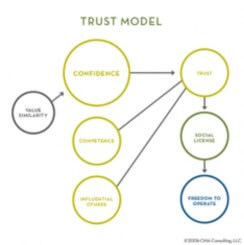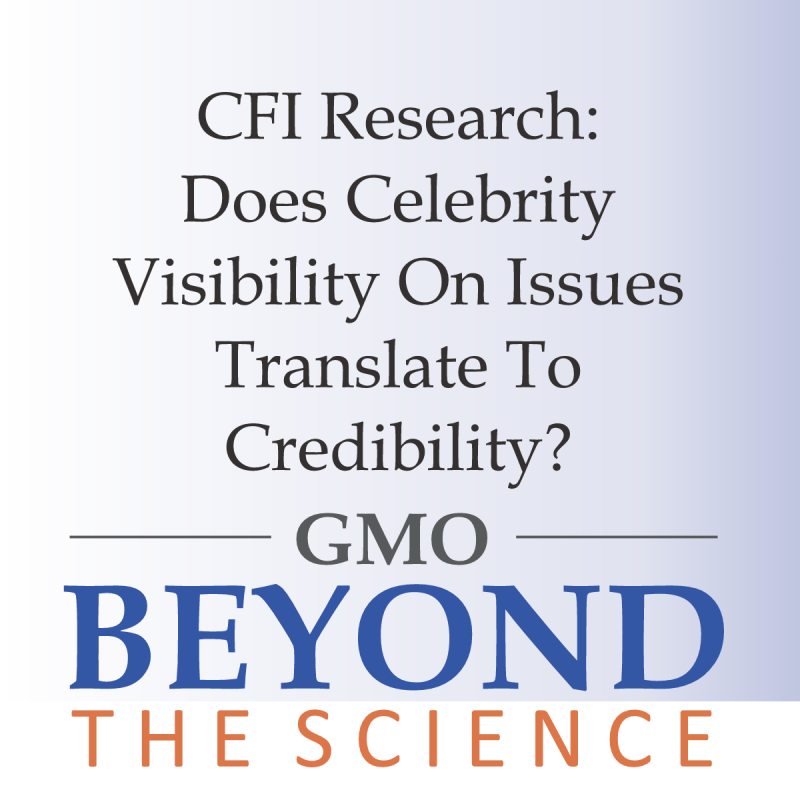 Charlie Arnot, CEO, Center for Food Integrity | March 3, 2017
Charlie Arnot, CEO, Center for Food Integrity | March 3, 2017
ALSO READ:
When Celebrity And Science Collide: Hollywood And The Anti-Biotechnology Food Movement
Julie Kelly
There’s no doubting science and farming communicators have struggled with how to inform consumers and the media on genetic engineering and other agriculture technology advances. But, the Center for Food Integrity’s (CFI) research shows that consumers don’t necessarily place a high degree of trust in celebrity experts. The research also shows it is, indeed, possible to introduce science into conversations with a skeptical public, but only after establishing shared values.

In CFI’s studies, consumers were asked to rate the level of trust they have in 15 sources of information on food. Family Doctor rated highest. University scientists and dietitians were also in the top five along with family and friends. Who was at the bottom of the list? Dr. Oz – and Food Babe finished only two spots higher. The results indicate there’s a big difference between visibility and credibility.
Farmers and food-makers have traditionally tried to convince consumers that modern farming technology is good for society by telling them how much more grain can be grown today on an acre of land compared to 50 years ago or how much more food can be processed and preserved efficiently and affordably because of modern machines and processes.
That’s the wrong starting point. Before citing facts and data, the food system must ask if its processes are sustainable and ethically grounded.
CFI has conducted extensive consumer research since 2007 and found that many people are uncomfortable with modern food production systems and the size and scale of today’s farming operations. The research routinely finds that consumers believe large farms and large food companies are more likely to put their interests ahead of consumer interests.
This matters, because when a company or an industry segment loses consumer trust, they also lose the social license to operate. Social license is the privilege of operating with minimal formalized restrictions based on maintaining public trust. Social license is granted when you operate in a way that is consistent with the ethics, values and expectations of the local community, customers, regulators, legislators and the media.

Once lost, either through a single event or a series of events that reduce or eliminate public trust, social license is replaced with social control, which is accompanied by regulation, legislation, litigation or market action designed to compel an entire industry to perform to the expectations of its stakeholders. Operating with social license is flexible and low cost. Operating with social control increases costs, reduces operational flexibility and increases bureaucratic compliance.
This atmosphere also squelches innovation and ultimately erodes the ability to produce healthy, affordable food.
We know technology and innovation help farmers produce more using fewer resources, which is critical in order to produce the food we need for a growing global population. But, if the public doesn’t trust the use of innovation and technology in the food system, producers can kiss their social license goodbye.
 That’s why it’s so important to begin a discussion about sustainability by ensuring ethical grounding in all aspects of the food system. CFI’s sustainability model has three parts. Sustainability requires ethical grounding first and foremost, then scientific verification and economic viability. In other words, the food system must first earn trust, which then opens the door to the science. Of course, any business can’t be sustainable without economic viability.
That’s why it’s so important to begin a discussion about sustainability by ensuring ethical grounding in all aspects of the food system. CFI’s sustainability model has three parts. Sustainability requires ethical grounding first and foremost, then scientific verification and economic viability. In other words, the food system must first earn trust, which then opens the door to the science. Of course, any business can’t be sustainable without economic viability.
There are a number of barriers to consumers integrating scientific information into their decision-making process. The influence of group values, confirmation bias, scientific illiteracy, the tribal nature of online communication and other factors all pose challenges to successfully introducing technical information into the social conversation about food and agriculture.
Supporting informed decision making requires communicators to embrace a new approach. Barriers can be overcome by following the formula developed through CFI’s research. It begins by identifying and communicating values from a credible messenger, then incorporating technical or scientific information that encourages informed decision making.
The foundation for specific strategies for effective communication include identifying relevant audiences, creating messages that audiences find believable, communicating those messages through the right channels, and developing a long-term values-based engagement strategy that starts with listening and embracing consumer skepticism.
Everyone understands ethics, but understanding how to demonstrate them in a way that builds consumer trust can be challenging. CFI has conducted some of the most extensive research to understand how to build consumer trust and we help our members put it to good use every day. It involves personal engagement, honest dialogue and throwing open the doors of transparency.
As we increase both the distance most consumers have from food production and the level of technology we implement, we must dramatically improve our ability and commitment to build trust with consumers and other stakeholders who grant social license. To be successful, food and agriculture must build and communicate an ethical foundation for their activity and demonstrate a commitment to practices that are ethically grounded, scientifically verified and economically viable.
 Charlie Arnot is the CEO of the Center for Food Integrity. The Center for Food Integrity is a not-for-profit organization that helps today’s food system earn consumer trust. Our members and project partners, who represent the diversity of the food system, are committed to providing accurate information and working together to address important issues in food and agriculture. The Center does not lobby or advocate for individual companies or brands. For more information, visit www.foodintegrity.org.
Charlie Arnot is the CEO of the Center for Food Integrity. The Center for Food Integrity is a not-for-profit organization that helps today’s food system earn consumer trust. Our members and project partners, who represent the diversity of the food system, are committed to providing accurate information and working together to address important issues in food and agriculture. The Center does not lobby or advocate for individual companies or brands. For more information, visit www.foodintegrity.org.
The Genetic Literacy Project is a 501(c)(3) non profit dedicated to helping the public, journalists, policy makers and scientists better communicate the advances and ethical and technological challenges ushered in by the biotechnology and genetics revolution, addressing both human genetics and food and farming. We are one of two websites overseen by the Science Literacy Project; our sister site, the Epigenetics Literacy Project, addresses the challenges surrounding emerging data-rich technologies.































